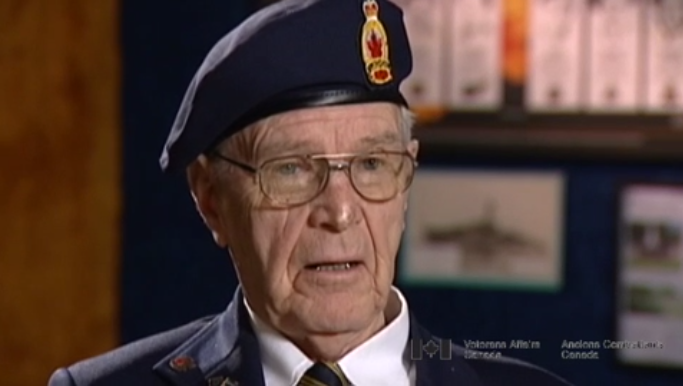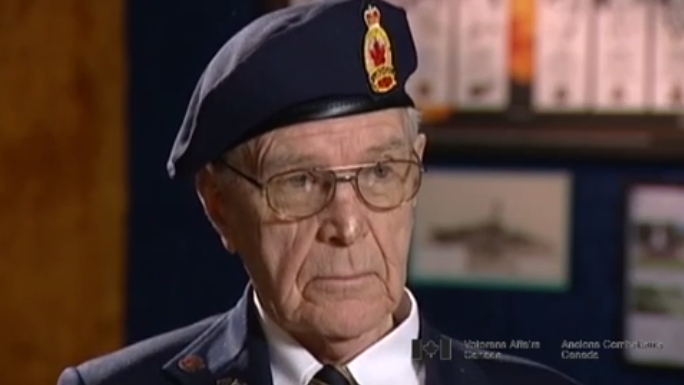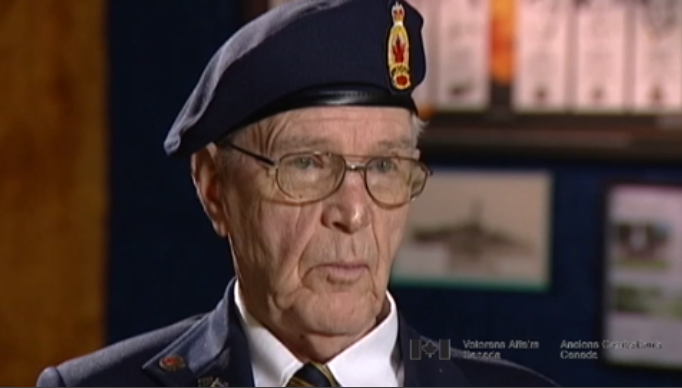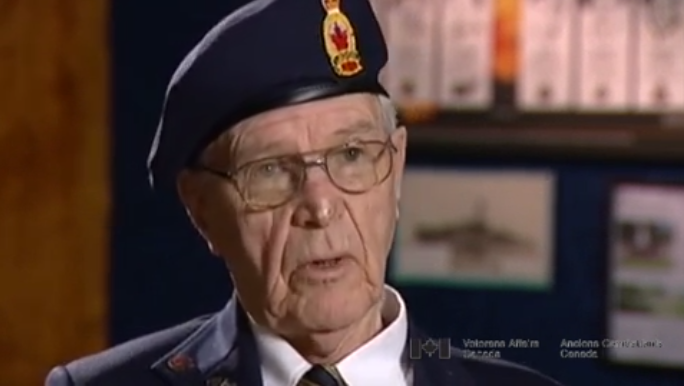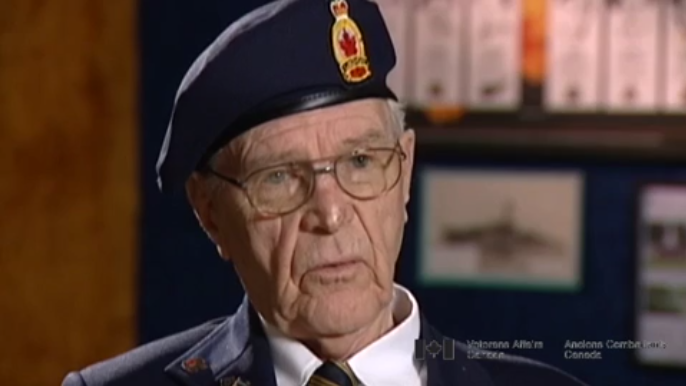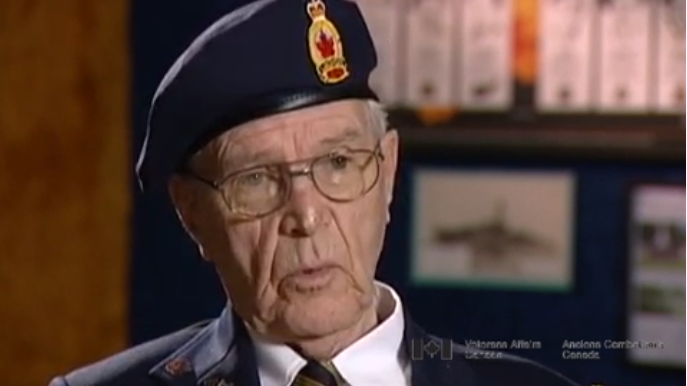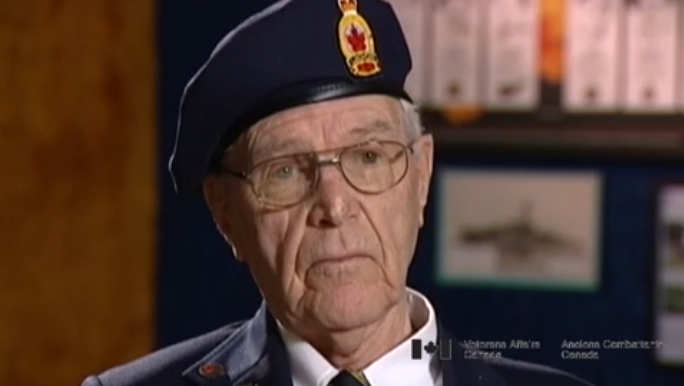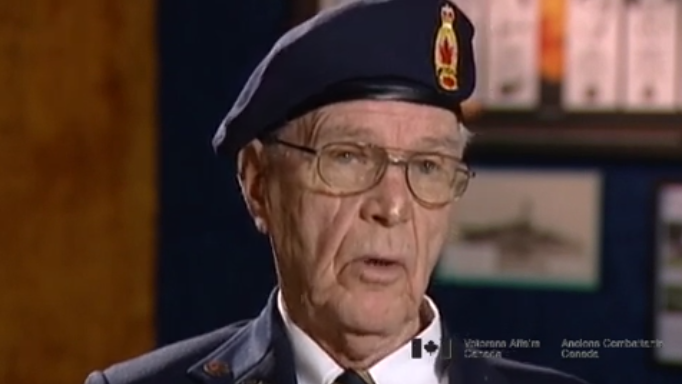He’s the first guy I saw dead on the beach
Heroes Remember - D-Day
He’s the first guy I saw dead on the beach
Transcript
We knew we, well we knew there was gonna be a D-Day and that was
well advertised. We knew it would be France, but we didn't know
where or when. And the where or when wasn't decided until the
last moment. We were boarded on ships and on our way and then we
knew that this was gonna be D-Day. The ocean was covered with
boats and ships and everything you can imagine, even tanks on
floats doing their own thing on the water, that's unimaginable,
but they did that. They had floats made that tanks could go on,
and then propel themselves right through and up the shore and
away they went. I was with D Company, or Dog Company, and
practically all our boats got blown up or had to go back because
there was so much mines. But I remember on our boat that one of
the guys got right up on the front of it and put his foot on one
of those mines and pushed it back, or else we'd have been blown
up, too. I might, I'll tell you a little story about getting on
ship. We were stationed at, on the Isle of Wight just before
going over and we . . . Come time to load on, to get on ship,
Southampton. I had a friend that always, we always, when we
parted, said "Well, we'll see ya" or something like that. He
always said he would never say goodbye to anyone, 'cause if he
did, they never saw each other again. So, we never did. We
always said "hi" or "so long" or "be seeing you." Anyway, we're
getting on ship, and I was here, and he was way down farther.
But I saw him and I waved at him, and he waved back and he said,
"Goodbye, John." And he's the first guy I saw dead on the beach.
Well, before I arrived on the beach, I saw a lot of gunfire and
aircraft overboard, and hundreds of ships and boats and tanks,
and all the rest of it out in the water. And a lot of mines
'cause the Germans had the water shoreline, under the water,
mined. Also the beaches were all mined. And then there was a, a
big gun emplacement, a bunker right in front of us that one of
our officers finally took out. He got in behind it, somehow, and
didn't get hurt and tossed a grenade in, and that was that.
That's the first Germans that I saw dead were in that bunker.
But it was very . . . it's like you see on the T.V. there, only,
only worse, where we're all scurrying up the beach and trying to
get up over the rise there and get into the town. We finally
did, of course. You couldn't hear each other, it was just
terrible. All the guns and stuff going. Not just our guns, but
the German guns, too, were right there. They were right in front
of us. Lots of dead. Lots of your own friends right there, you
know, who didn't make the grade, either wounded or dead. You
didn't have time to think about anything, nothing. You just did
your thing best you could. I, mine was to get communication out
to, out to battalion headquarters, or wherever my company
commander wanted communication. I was the guy that did that.
And, so you don't have time to think about anything, you just go
and do. I might say that once we got a foothold and got in
France, I don't know how far away, maybe a kilometre or less, we
had our what they call self-propelled guns, and these were big
guns mounted on self-propel-like, Bren gun carriers, or
something like that. And I knew my kid brother was with that
artillery outfit, they were direct support to us. Anyway, we got
in there a little ways and I'm down on my wireless set, and I
saw one of these things coming, and I hollered up. I said, "Does
anybody know Cecil Hall?" And this black charcoaled face, face
stuck over the machine there, and he said, "Sure do, John.
How are you doing?" And that was my brother.
Description
Mr. Hall describes the chaos of D-Day and a chance meeting with his brother.
John Hall
Mr. Hall was born in Whitewood, Saskatchewan, in 1921. He worked on the family's farm until he enlisted in the Royal Regina Rifles. He was shipped overseas on a converted sugar freighter. Once in England, Mr. Hall experienced the Battle of Britain from the perspective of the local citizenry. He spent more land duty in a mail sorting depot until his Regiment joined the D-Day invasion at Juno Beach. He was a radio operator. Mr. Hall took part in numerous actions, most notably Caen, Calais and the Leopold Canal and the Liberation of Holland. After leaving the Army, Mr. Hall worked in the Canadian North with the Department of Natural Resources.
Meta Data
- Medium:
- Video
- Owner:
- Veterans Affairs Canada
- Duration:
- 5:01
- Person Interviewed:
- John Hall
- War, Conflict or Mission:
- Second World War
- Location/Theatre:
- France
- Battle/Campaign:
- Normandy
- Branch:
- Army
- Units/Ship:
- 436 Squadron
- Rank:
- Corporal
- Occupation:
- Signalman
Related Videos
- Date modified:



